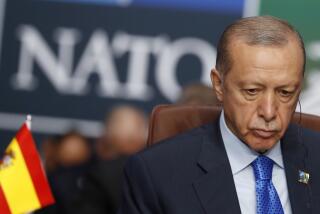Milking the ‘Genocide’ Vote : Turkey: The U.S. Senate will do unnecessary harm to an important ally if it passes a resolution that indicts Turks for killing Armenians 70 years ago.
- Share via
Sometimes even a fan of limited government wishes that Congress would find some useful work to do. The approach of Senate debate on an Armenian genocide resolution is one such moment.
This hardy perennial, which on its face aims merely to commemorate the Armenian victims of ethnic fighting in the last days of the Ottoman Empire (roughly 1915-23), and to fix the blame on the Turks, is back again after having been rejected several times in recent years. This time it is championed, strangely, by one of its former opponents, Bob Dole. His change of heart has made the measure’s chance for passage a serious threat.
To the average member of Congress, well-trained in the art of meaningless pandering, the resolution looks like just another National Anchovy Week. (No joke; there probably is one.) An easy vote.
Not this time.
A visitor in Turkey comes away convinced that, just when this under-appreciated country should be rising in America’s priority and estimation, our frivolous legislators are preparing to offend a whole nation and damage a relationship we should be working to strengthen.
No one disputes that Armenians suffered a loss tragic in scope. Armenians put the toll at 1 1/2 million lives; Turks say that most were casualties of war, not of pogroms. But on this issue, rationality and a sense of our national interests desert Armenian Americans. Gov. George Deukmejian, one of America’s most thoughtful public figures, is emotional and illogical on only one subject, this one. His anguished persistence, and that of the California-centered Armenian American community--successful, civic-minded, politically active patriots all--is solely responsible for the regular revival of this bad idea.
One need not quarrel (though many do) with the Armenian version of history to oppose a resolution that would deeply insult a true ally of rising importance. Ironically, Turks have been the victims of modern pogroms--in Cyprus in the 1970s, in Bulgaria and Thrace at this very moment. But, however horrific the events of 1915, they occurred before any current Turkish leader was born. And the insult is not merely to a few politicians but to an entire people that already feels somewhat friendless and believes--who can tell them otherwise?--that this “commemorative” judgment by our learned congressional historians would be but the prelude to a barrage of land and compensation claims.
While the world awaits the first serious economic reform from Czar Mikhail I, in Turkey the uncharismatic Turgut Ozal, in office just one year longer, has quietly executed a brave and far-reaching restructuring. Tax reform, control of state spending, a flowering stock market, privatization and other measures are beginning to take hold. Turkey has faithfully met its payments on foreign debt (almost all incurred pre-Ozal) and attained Europe’s highest average growth rates in the ‘80s. It is one of the few countries with which the United States runs a trade surplus. Yet, with inflation still a major problem, and saddled with a political clumsiness that matches its economic wisdom and courage, the Ozal government is on very wobbly legs.
Under the humiliation of the Dole resolution, Ozal leaves a guest with no doubt that retaliation against vital U.S. intelligence, military assets or perhaps trade opportunities is a certainty.
Most important in this issue, the world needs a successful Turkey as a demonstration that an Islamic society can be secular, prosperous and peace-loving. The extremists in Tripoli, Tehran and Damascus hate what Turkey stands for. On the positive side, consider the potential benefits to the West of a Turkish bridge to the 60 million Turkic people living on the fringes of the Soviet empire and beyond.
Ever since Kemal Ataturk created a secular, westward-looking nation out of the Ottoman wreckage, Turks have faced the half-breed’s dilemma of never feeling totally accepted in either of two worlds. Lately, their paranoia has been heightened by the European Community’s rejection (at least until 1992) of Turkey’s membership application and by perceptions of double standards: “Gorbachev talks to Latvians and shoots Azeris”; the Turk-on-the-street will say: “The Chinese kill their own and you condemn, but Russians kill Turks and you applaud!” A poll by an Ankara newspaper this month found the United States ranked ahead of the Soviet Union as “unfriendly to Turkey.”
Don’t kick friends for things they personally didn’t do. Don’t trifle with national interests in reaction to non-authentic political pressure. These are rules that even members of Congress can grasp.
More to Read
Get the L.A. Times Politics newsletter
Deeply reported insights into legislation, politics and policy from Sacramento, Washington and beyond. In your inbox twice per week.
You may occasionally receive promotional content from the Los Angeles Times.










